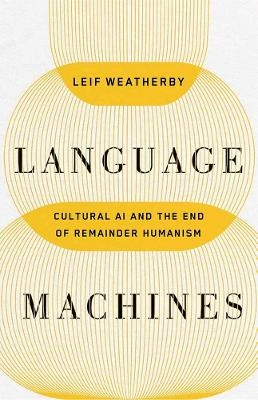
Language Machines
Cultural AI and the End of Remainder Humanism
Seiten
2025
University of Minnesota Press (Verlag)
978-1-5179-1931-3 (ISBN)
University of Minnesota Press (Verlag)
978-1-5179-1931-3 (ISBN)
- Noch nicht erschienen (ca. Juni 2025)
- Versandkostenfrei
- Auch auf Rechnung
- Artikel merken
How generative AI systems capture a core function of language
Looking at the emergence of generative AI, Language Machines presents a new theory of meaning in language and computation, arguing that humanistic scholarship misconstrues how large language models (LLMs) function. Seeing LLMs as a convergence of computation and language, Leif Weatherby contends that AI does not simulate cognition, as widely believed, but rather creates culture. This evolution in language, he finds, is one that we are ill-prepared to evaluate, as what he terms “remainder humanism” counterproductively divides the human from the machine without drawing on established theories of representation that include both.
To determine the consequences of using GPT systems for language generation, Weatherby reads linguistic theory in conjunction with the algorithmic architecture of LLMs. He finds that generative AI captures the ways in which language is at first complex, cultural, and poetic, and only later referential, functional, and cognitive. This process is the semiotic hinge on which an emergent AI culture depends. In light of this, Weatherby calls for a “general poetics” of computational cultural forms under the formal conditions of the algorithmic reproducibility of language.
Locating the output of LLMs on a spectrum from poetry to ideology, Language Machines concludes that literary theory must provide the backbone of a new rhetorical training for our linguistic-computational culture going forward.
Looking at the emergence of generative AI, Language Machines presents a new theory of meaning in language and computation, arguing that humanistic scholarship misconstrues how large language models (LLMs) function. Seeing LLMs as a convergence of computation and language, Leif Weatherby contends that AI does not simulate cognition, as widely believed, but rather creates culture. This evolution in language, he finds, is one that we are ill-prepared to evaluate, as what he terms “remainder humanism” counterproductively divides the human from the machine without drawing on established theories of representation that include both.
To determine the consequences of using GPT systems for language generation, Weatherby reads linguistic theory in conjunction with the algorithmic architecture of LLMs. He finds that generative AI captures the ways in which language is at first complex, cultural, and poetic, and only later referential, functional, and cognitive. This process is the semiotic hinge on which an emergent AI culture depends. In light of this, Weatherby calls for a “general poetics” of computational cultural forms under the formal conditions of the algorithmic reproducibility of language.
Locating the output of LLMs on a spectrum from poetry to ideology, Language Machines concludes that literary theory must provide the backbone of a new rhetorical training for our linguistic-computational culture going forward.
Leif Weatherby is associate professor of German and founding director of the Digital Theory Lab at New York University. He is author of Transplanting the Metaphysical Organ: German Romanticism between Leibniz and Marx.
| Erscheint lt. Verlag | 24.6.2025 |
|---|---|
| Reihe/Serie | Posthumanities |
| Zusatzinfo | 17 black and white illustrations |
| Verlagsort | Minnesota |
| Sprache | englisch |
| Maße | 140 x 216 mm |
| Gewicht | 425 g |
| Themenwelt | Informatik ► Theorie / Studium ► Künstliche Intelligenz / Robotik |
| ISBN-10 | 1-5179-1931-2 / 1517919312 |
| ISBN-13 | 978-1-5179-1931-3 / 9781517919313 |
| Zustand | Neuware |
| Haben Sie eine Frage zum Produkt? |
Mehr entdecken
aus dem Bereich
aus dem Bereich
Buch | Softcover (2024)
REDLINE (Verlag)
CHF 27,95
Eine kurze Geschichte der Informationsnetzwerke von der Steinzeit bis …
Buch | Hardcover (2024)
Penguin (Verlag)
CHF 39,20


